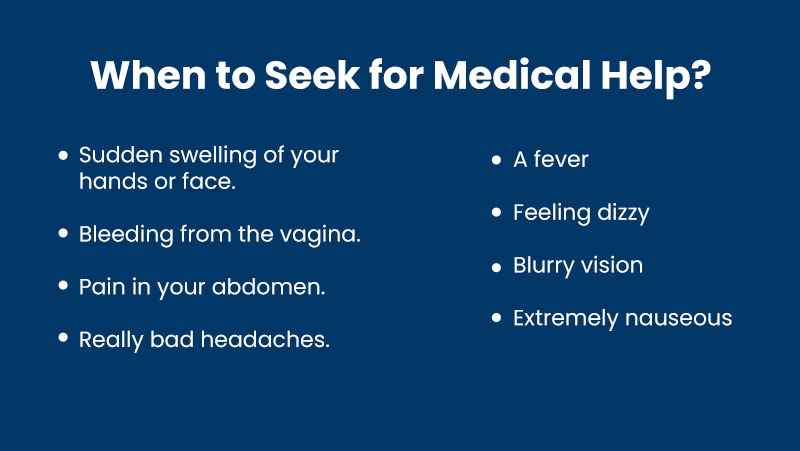We all know how exciting it is to be pregnant, but let's be honest – it's not always as easy as it seems. Most of the time, being pregnant goes smoothly. But yes, sometimes, unexpected complications do happen. It can affect both the mother's and the baby's health.
Occasionally, if the mother had certain health issues before getting pregnant, it can make things a little more complicated during pregnancy. That is why we are here today to address the unspoken complications during pregnancy.
Complications During Pregnancy— Causes
Pregnancy can have complications for different reasons. History of any kind of health issues or ones that show up because of pregnancy in expecting moms can be one of the causes.
Some common diseases and conditions that can make your pregnancy more complicated are:
- High blood pressure
- Cancer
- Infections
- Diabetes
- STDs (Sexually transmitted diseases, including HIV)
- Epilepsy
- Kidney problems
- Anemia
Other things that might increase the chance of complications include:
- Teen pregnancy
- Getting pregnant when older
- Smoking cigarettes or consuming alcohol and illegal drugs
- Eating disorders like anorexia
- Having more than one baby, like twins or triplets
- Medical history of pregnancy loss or giving birth too early
Consulting a doctor early in the pregnancy journey can lower the chances of complications so that they can be treated before they get worse.
What are the Common Pregnancy Complications?
Sometimes it can be a little difficult to tell the difference between regular signs of pregnancy and signs of complications. However, pregnancy can have complications for different reasons. Sometimes, pregnant women might have health issues that can affect both the mother and the child. Even if you are healthy before getting pregnant, you might still have problems. These complications can make the pregnancy more risky.
Sometimes it can be a little difficult to tell the difference between regular signs of pregnancy and signs of complications.
However here are a few early pregnancy complications you should be aware of when pregnant—

Miscarriage
A miscarriage is the loss of a pregnancy within the first 20 weeks, with more than 80% occurring in the first trimester. It happens with about 10% to 20% of pregnant women. It is quite a common phenomenon among pregnant women. Therefore it is very important to take good care of yourself, especially during the first 3 months of your pregnancy period.
Ectopic Pregnancy
This is when the fertilized egg attaches itself outside the uterus, mainly in the fallopian tube. It is necessary to get medication and surgery at the right time to remove the ectopic tissue. If not taken care of Ectopic pregnancy can rupture the fallopian tube.
Hyperemesis Gravidarum (HG)
HG involves serious and consistent vomiting during pregnancy, leading to dehydration and weight loss. Managing this condition is important for both the mother's and the child's health.
However, these complications don't stop here. Expecting mothers also need to look out for later pregnancy complications that are equally frightening.
Gestational Diabetes
Hormonal changes during pregnancy can make it challenging for the body to manage blood sugar levels. Most people can manage it through diet and exercise, but some may require medication to avoid serious health issues.
Preterm Labor
Going into labor before 37 weeks is generally known as preterm labor. This can lead to the delivery of a baby with low body weight or underdeveloped organs, posing potential health risks.
Preeclampsia
High blood pressure during pregnancy can lead to preeclampsia which normally develops in the second half of pregnancy or post-delivery. It affects about 10% of expecting mothers and is extremely common in women already dealing with high blood pressure.
Vaginal Bleeding
Heavy or excessive bleeding at any point during pregnancy requires immediate medical attention. It could be an indication of serious issues that need to be addressed instantly.
Low Amniotic Fluid (Oligohydramnios)
The decrease in amniotic fluid around the fetus increases the risk of premature birth. This is more common than the pregnancy complication— polyhydramnios, where there is too much amniotic fluid leading to complications.
Infections
Various viral and bacterial infections, such as yeast infections, UTIs, and STIs, can cause complications during pregnancy. Some infections can even be transmitted to the fetus which can be more dangerous.
Placenta Problems (Placenta Previa or Placenta Accreta)
Pregnancy complications involving the placenta can hamper the normal procedure of labor or delivery. Placenta previa is part of a group of problems called the placenta accreta spectrum. In these problems, the placenta grows into the wall of the uterus. Therefore, placenta accreta can cause heavy bleeding while pregnant or during and after giving birth.
Anemia
It is a lack of red blood cells commonly caused by iron deficiency during pregnancy that usually results in fatigue and weakness. There are four types of anemia: anemia of pregnancy, vitamin B-12 deficiency, iron deficiency anemia, and folate deficiency.
Being anemic during pregnancy can affect your baby’s development sometimes even resulting in early labor.
Depression and Anxiety
One of the most important things to take care of in pregnancy is your emotional and mental well-being. Remember, extreme sadness or anxiety can affect the development of the fetus.
Also, discussing symptoms openly with your medical team is extremely crucial for the timely detection and operation of any complications caused during pregnancy. Do not forget that all you need is specialized care.
Teen Pregnancy Complications
Certain complications occur often in teen pregnancy, normally under the age of 15. These issues include:
- Giving birth too early.
- Developing high blood pressure during pregnancy (PIH or toxemia).
- Not having enough red blood cells (anemia).
- Facing challenges during delivery.
Studies also show that there's a higher chance of the baby not surviving (infant mortality) when parents are teenagers.
Prevention
- Keep a healthy diet before, during, and after pregnancy.
- Exercise regularly during your pregnancy to stay healthy.
- If you're planning to conceive, try to control any ongoing health issues.
- Quit smoking.
- Get your prenatal checkups, ultrasounds, and tests on time.
- Try to stay relaxed and get enough sleep especially when you are pregnant. Using a pregnancy body pillow can be helpful.
- Take the prenatal vitamins prescribed by your doctor.
Remember most women go through uncomplicated pregnancy. So bring calm when stressed. Research shows that only about 8% of expecting mothers face complications that could be harmful if not taken care of.
ELI&ELM SPECIAL OFFER!
The Key Takeaway!
Finding out about pregnancy complications can make you worried and it is normal to feel that way. You are not alone in this. Many pregnant women have to go through various pregnancy complications, however, do not stress bout things that are not in your hands. Remember stress can make things more difficult.

Most pregnancy complications can be easily handled, especially when found early. Say alert, enjoy your pregnancy journey, and trust your healthcare team. With care and positivity, you can walk the path to welcoming a healthy baby into the world.
Sources:
Cleveland Clinic: Pregnancy Complications





















